Driving the digital economy
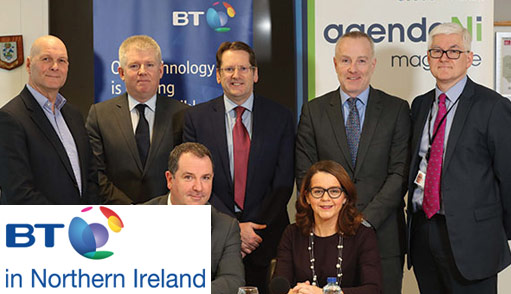
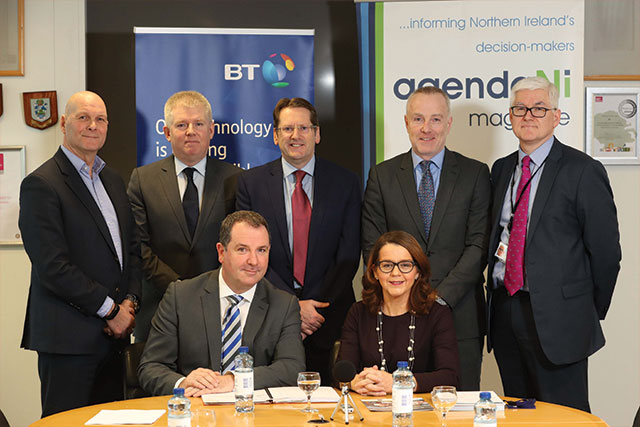
BT Northern Ireland hosted a round table discussion on how Northern Ireland can develop its digital economy and become a smart region.
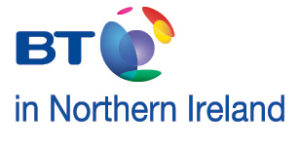
What does the Northern Ireland digital economy look like?
Trevor Steenson

From a public sector perspective, it is about enabling the citizen to conduct business with government at a time and a place of their choosing, using digital in all its aspects – desktop and increasingly mobile.
Paul Murnaghan
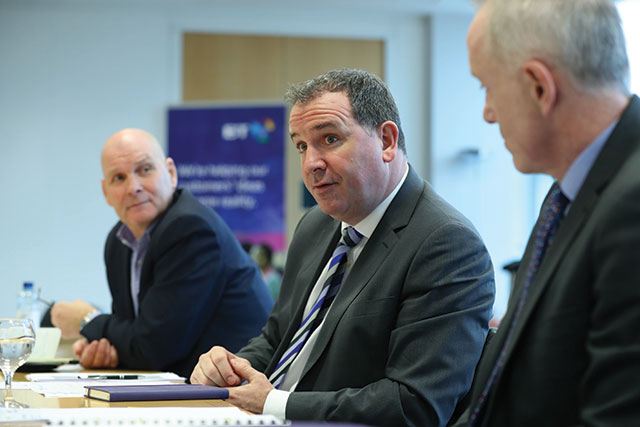
Looking across both the public and private sectors, it is about enabling optimum services in terms of quality, ease of access and ease of delivery while achieving cost efficiencies – and that is by shifting from more traditional channels to digital channels. It is about making the user experience more appropriate and getting to a quality of service the citizen demands.
We will only achieve the ambitions we all have for a digital economy if the private and public sector collaborate and work in partnership. BT works through the NI Direct Strategic Partnership with the Digital Transformation Service (DTS) which provides public sector organisations with access to a network of IT services and partners to digitally transform the delivery of public services. We’re passionate about supporting and driving the digital economy and we have many success stories of what a collaborative process can deliver. Take AccessNI as an example where we introduced an online disclosure service, the project was delivered by BT Business in Northern Ireland with DTS and partner Civica.
Donal Durkan

From a Belfast City Council perspective digital is split into two areas. The first is digital infrastructure and the second is supporting citizens and businesses to use the digital infrastructure. From the business side it is about more start-ups and growing existing businesses and to attract more FDI into the city. In the business sector we have a strong, vibrant digital economy at the moment. Our role is to see what we can do as a public sector body, together with our stakeholders, to ensure how the ecosystem can drive more of that development and investment into the city.
Jackie Henry
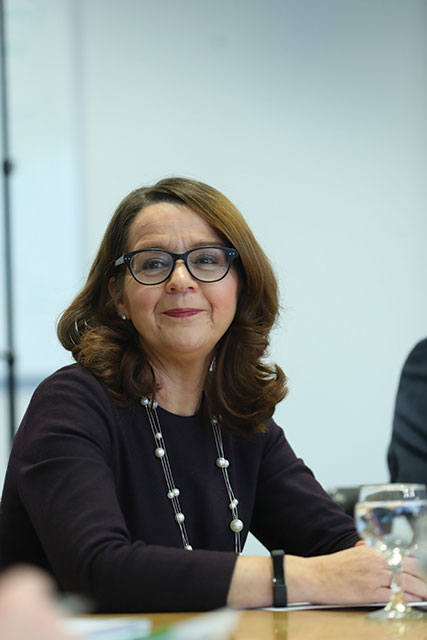
There are four parts to the digital economy. The first is the citizen – how do we support and equip our citizens to make them digital-savvy. Surveys have shown that they have a desire to do more online, so we have to give them the confidence and trust in our systems to do more online. Secondly, we need an excellent public service delivery network which needs to be world class. The other two elements are talent and the digital eco-system. We need to invest in our talent and in our collaboration networks to get the critical skills needed.
Colum Boyle
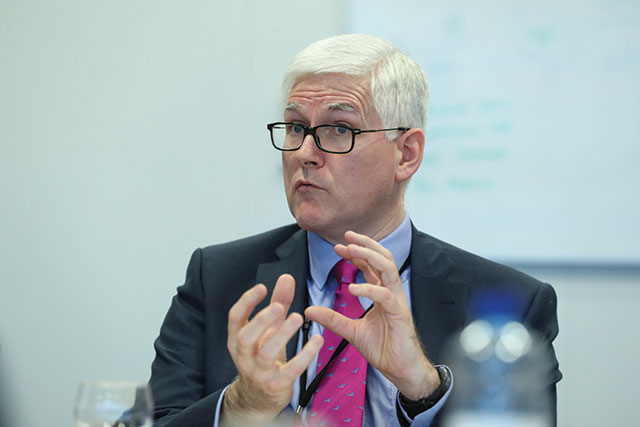
The digital economy is about being able to buy, sell and transact online, and from a public sector point of view providing the highest quality of services. I would also like to see a uniformity right across the economy, where irrespective of which organisation you are dealing with, you will see the same standard of delivery – whether you are dealing with a public service or doing your banking online the experience should be the same and should follow through end to end. For government it is about trying to evaluate what is already there and then taking the opportunity to deliver world-class services – but it does require investment.
Bob McClean

I would take a different slant on this. Having been exposed to government services elsewhere in the UK, Australia and Singapore, the digital economy in Northern Ireland is quite impressive. The NI Direct programme has been called out as being ahead of the curve and we are well on the way to having something in place by 2025, which seems to be the target date by which if you are not there by then, you have missed the boat. From a comparative level we are quite good but still have a lot to do. There are fundamental building blocks that need to be in place and then supported.
Donal Durkan
The critical point is that the building blocks are there and we now need to accelerate the digital economy in terms of eco-system, talent, infrastructure and the research centres in our universities. We have all the right ingredients in place.
How can businesses realise their digital potential, through either improving the user experience or exploiting shared infrastructure and services?
Trevor Steenson
The ‘16 by 16’ programme has started the whole digital transformation for government and has delivered some very successful projects. The next phase is to become user centric and we now need to develop trust to make that happen. There is also a percentage of the population who can’t and won’t use digital services and we cannot forget them when delivering our services.
Bob McClean
That is an important issue but you shouldn’t categorise people. The biggest growing demographic on Twitter are grandparents. There are fewer and fewer people getting left behind and time alone will help address this problem. From a government perspective, trust must be built on something tangible; something that has worked. For example, Access NI was delivered through NI Direct and went from zero to 73 per cent online and is now 99 per cent online. Whilst I accept there will be some situations where digital is perhaps not suitable, some areas, such as healthcare, are moribund by paper-based systems. There is still a lot of the public sector that needs to be moved to digital.
Colum Boyle
There is an appetite for digital in Northern Ireland. In Land & Property Services we have the ‘turn of year’ whereby the rates bills are issued in April. When I joined the organisation three years ago this would have been a major event lasting three to four weeks, with people manning the phones and dealing with large volumes of calls. Between NI Direct and ourselves we have worked together to reduce the volume of calls and the process has been reduced from weeks to days. It is now well managed with many paying their rates bills online. It has given people choice and has led to much avoidable contact being reduced and a much better customer experience. In the public sector we need to do more customer insight work to determine how customers want to interact with us. Understanding what drives particular customer groups can then feedback into service and channel design.
From a value for money perspective we have 10 per cent less operational staff, with many of them going on the voluntary exit scheme.
Jackie Henry
There are lots of good examples elsewhere in the world and these are well understood and documented. We need to accelerate what we are doing. We need excellent infrastructure and to have continuous investment to ensure we are staying ahead. We need funding, including venture capital and equity funding, and we need to learn as much as possible from elsewhere.
Colum Boyle
Exemplars breed exemplars. Good local digital projects will help accelerate things greatly.
Donal Durkan
Infrastructure is a fundamental aspect of digital. Project Kelvin has been key for driving investment into Belfast. The other key element is the development of a digital strategy. The 2016 Matrix report made a strong case on how to grow the industry locally. One aspect of this is cybersecurity. Belfast is the number one city in the world for FDI investment from America in cybersecurity. That success is due to a cocktail of research excellence, talent, connectivity, public funding and the collaboration between public, private and academia. There are currently 1,200 people employed in cybersecurity businesses around Belfast and of the 12 investments in cybersecurity on the island of Ireland eight are in Belfast.
Paul Murnaghan
We should focus on what works well here. There are a number of successful clusters including cybersecurity, fintech and pharma. The government services cluster has not been exploited to the same extent. This includes back office and shared services and digital government. There is a strong leadership in this area in Northern Ireland and our public sector has the capability and the skills to work collaboratively with the private sector to build a government services cluster to serve citizens elsewhere.
Jackie Henry
In Deloitte, when we developed our digital delivery centre in Northern Ireland the senior management team nationally was impressed by the skills, talent, creativity and innovation locally. They came first for perhaps the price point but were wowed by the talent and creativity.
How do we use digital transformation to improve outcomes for government?
Trevor Steenson
We need the alignment of HR, accommodation, procurement etc. with digital transformation. The advantage of good customer service is not always recognised in the business case which is focused on the economics.
Colum Boyle
The World Bank does a regular survey on how easy it is to do business around the world and the UK is well down the rankings. Political certainty and the regulatory framework are key elements of that, including the ease of setting up and expanding a business. There are good examples that have been mentioned but there are areas where we can do things differently, for example planning, and look at other regions that have successfully ‘hot-housed’ development. We have a lot of the right ingredients but it is about getting the mix right.
Donal Durkan
It terms of alignment education is a key area. We need to look at what the market needs in five to 10 years’ time and develop our curriculum to align to these needs so that we have the talent pool to meet the next wave of development.
The diaspora is also important in getting out into the market. NI Connections does a fantastic job in developing our links with the diaspora and works effectively alongside Invest NI and Belfast City Council. Research we did some years ago on why people make investment decisions has four elements: access to market, talent pool, ease of doing business, and corporation tax and incentives. The priority around these will change depending on the sector and there is also now some uncertainty around some of these for Northern Ireland.
Bob McClean
Investors take a longer-term perspective. We were a local indigenous company acquired by Civica who highlighted talent and ease of doing business here as key factors in their investment decision.
Paul Murnaghan
Government is now looking at what the next phase of digital transformation should look like. We have shared services in central government, education and health. The opportunity now is to bring these together in some form of collaboration. Ultimately as a citizen I don’t care if I’m dealing with central or local government I just want access to my services. Northern Ireland is well ahead in shared services but we now need to look at the next generation of services in both back and front offices. We also should look at the public service in the round in order to drive out more efficiencies and improve services that are delivered by more than one part of government.
Jackie Henry
Looking at the draft PfG outcomes, if we don’t have that joined-up approach we are not going to achieve those outcomes. We need to work across the various silos and boundaries right across government and ensure services are taken end-to-end. One recent personal experience was the registering of a death and it was not great and we clearly have a lot to do in that area.
Trevor Steenson
The ‘16 by 16’ programme was a good ‘kick-starter’ for digital transformation. The programme consisted of mostly vertical projects. The next stage will focus on projects that slice across government, following the user journey.
Donal Durkan
Belfast City Council recently published the Belfast Agenda, which is the statutory community plan for the city. There is a direct read across from the PfG. To deliver this will require much more collaboration between regional and local government to achieve those outcomes.
Bringing all the aspects of digital together, both public and private, how do we develop a smart region/city?
Colum Boyle
I did an Open University e-course on smart cities last January – a really easy and enjoyable learning experience. The course was full of great examples of smart cities from Rio to Milton Keynes. Belfast City Council is pushing hard on a number of fronts. For example, in the Belfast Future Cities Catapult project we are working with the Council to maximise non-domestic rates income. There are great examples of smart cities. One that comes to mind is a system that enables people with disabilities to move around a city and be guided in using public transport. There are many good examples elsewhere and let’s see what works and implement them here. Translink has announced a single ticket infrastructure for Northern Ireland which is a good start for smart travel.
Bob McClean
We will build a smart city by putting the fundamentals in place such as a joined-up transport system. The smart city is easily articulated but it is much harder to work out how to get there. Joining up the transport infrastructure with the telecoms infrastructure would move things forward. Why do I even need a card? Could I not use my phone? We need a few more building blocks to be put in place to make the city smarter.
Jackie Henry
I think we should pick our projects and then recognise the ones that we can really execute. There are some amazing examples elsewhere but we need to focus on what we can practically do. We also need leadership and to take a joined-up approach – maybe transport is a good example where we could move from smart ticketing to smart mobility.
Donal Durkan
We already have some of the ingredients to build a smart city. In Belfast City Council we have a smart cities team and Belfast has recently been listed as one of the Rockefeller 100 Resilient Cities. We are working with Digital Catapult on ‘The City as a Lab’ programme to look at how we capture and use information and data around the city. There are a lot of individual elements that now need to be linked together.
Paul Murnaghan
In order to have a smart city you need to have the right infrastructure in place, including Wi-Fi and BT is pivotal in the provision of that. To be truly smart Wi-Fi has to be pervasive across the whole city region and telecoms infrastructure is a key enabler of that. I would also say we need to make collaboration between the public and private sectors the norm. With the right support from the likes of ourselves in BT, organisations can be confident about embracing technology to effect real and positive change for their staff and importantly for their service users.
Bob McClean
One of the key aspects of a smart city is that people don’t have to actually come into it. That requires an infrastructure to let them work virtually in the city.
Donal Durkan
That is an important feature of becoming a smart city, particularly for Belfast with 58 per cent of the people working in the Belfast City Council area do no live within that area.
Trevor Steenson
Another key aspect is having access to public sector information. You can’t have a smart city without information and opening up government data will drive the innovation required for a smart city. We have now developed an open data strategy and we are starting to see organisations release their data and that will drive a lot of innovation.
Choose one area that senior managers and policy makers should focus on to make the digital economy happen.
Bob McClean
Co-ordination. We have the building blocks but the co-ordination of these lacks a clear vision and platform.
Colum Boyle
There are so many priorities identified in today’s discussion; we should focus on a few priority areas and then back those with real investment.
Jackie Henry
Play to our strengths. Pick the areas and focus on them. For example, we need to identify three more CSITs and then go for it!
Donal Durkan
It’s co-ordination and investment. Education is also critical but if I had to put my money on one area it would be cybersecurity, which is going to be pervasive in every sector.
Paul Murnaghan
It is making digital a top three agenda item in board rooms across both public and private sectors. It is now a priority in many organisations but not enough. There also needs to be consistent leadership across the public sector with a ‘digital czar’, a chief digital officer for all 12 departments and public bodies to pull together public services in the same direction.
Trevor Steenson
A single view of our citizen would enable more personalisation and it would allow us to be more proactive rather than reactive. So when you turn 17 the application form for your driving license comes to you. It would also drive out great efficiencies by removing duplication and rework. It is not without its challenges particularly around the privacy area.
Participants
Colum Boyle
Colum Boyle is the Chief Executive of Land & Property Services, the leading government authority in Northern Ireland for valuation, rate collection, land registration and mapping services. Colum’s previous roles include Director of the Employment Service within the Department for Employment and Learning, and Director of Business Development in the Northern Ireland Social Security Agency.
Donal Durkan
Donal Durkan is Director of Development, Belfast City Council. He has over 27 years’ experience working in the area of Economic Development. He has a Certified Diploma in Accounting and Finance (ACCA) and a Postgraduate Diploma in Strategic Planning with the Irish Management Institute. He was previously Executive Director, Strategy at Invest NI. He is an Independent Board Member with Colleges Northern Ireland and represents Belfast City Council on the Ulster University Economic Policy Centre Advisory Board. He is also a council member of the NI Chamber of Commerce and Industry (NICCI) and he sits on the NI Science Park (NISP) CONNECT steering group on developing the Knowledge Economy.
Jackie Henry
Jackie Henry is Senior Partner of Deloitte in Northern Ireland, having been with the firm for over 25 years. She is a chartered accountant by profession and a graduate of Queen’s University Belfast with a first class honours degree in Accountancy. Jackie is a member of CBI Council in Northern Ireland and an Honorary Fellow of Belfast Metropolitan College. In 2016 she was awarded an MBE for her services to the economy in NI and was made a visiting professor of Ulster University. In 2014 she received the Women in Business Northern Ireland award for Outstanding Leadership and Management. She is married to Ronan and the proud mother of three children, Rory, Conor and Amy.
Bob McClean
Bob McClean is Business Development Director at Civica. Having started in engineering, and gravitated to commercial roles across Europe, Bob returned to Northern Ireland in 2004, joining the then recently formed Asidua – a specialist software development and integration organisation. As a member of the board, Bob helped oversee 10 years of growth and the sale of Asidua to Civica group. Bob is now the Business Development Director for Civica Digital.
Paul Murnaghan
Paul Murnaghan is Regional Director for BT Business NI. A graduate of Queen’s University Belfast in Electronic Engineering he also holds a Post Graduate certificate in IT and a Diploma in Business Management from Ulster University. He has over 25 years’ experience in in the IT industry with BIS Beecom, Parity and BIC Systems. He joined BT through their acquisition of BIC Systems. Paul is a board member of Helm Housing Association and a member of the CBI Public Sector Reform Sub-group. Married with four children, Paul is a former Irish Water polo international and still has an active involvement in the sport.
Trevor Steenson
Trevor Steenson is Deputy Director of Digital Shared Services within the Department of Finance. For the last two years he was the Digital Transformation Programme Director responsible for delivering the Northern Ireland Governments ‘16 by 16’ programme of projects aimed at increasing the number of government services available online. Trevor’s current responsibility includes taking forward digital transformation across the public sector including personalisation of online services to increase citizen engagement with government.






